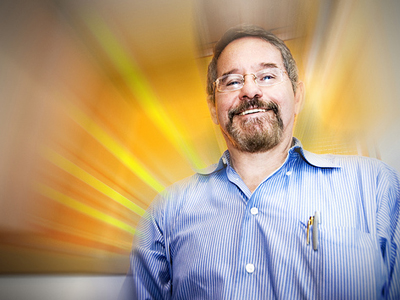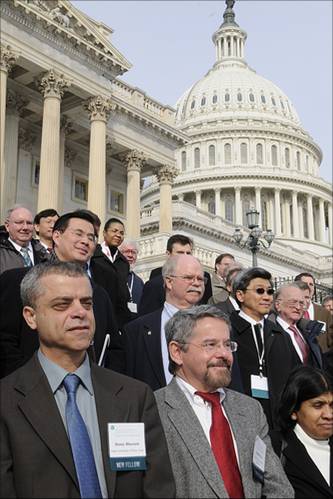Nanomachine Pioneer from UC San Diego Wins Top Australian Medal in Electrochemisty
San Diego, April 12, 2012 -- UC San Diego nanoengineering professor Joseph Wang will accept the 2012 Breyer Medal in person this Sunday, April 15, in Perth, Australia. The medal is the top Australian award in the field of electrochemistry, and it will be presented at the annual Royal Australian Chemistry Institute (RACI) Electrochemistry Symposium.
|
“I am extremely honored to accept the Breyer Medal,” said Wang ahead of the meeting in Perth. “This is really a validation of the work being done by more than 20 active researchers in our Laboratory for Nanobioelectronics at UC San Diego.”
The Australian symposium will lead into the 10th spring meeting of the International Society of Electrochemistry (ISE), which also takes place in Perth. ISE will run through April 18 at the University of Western Australia, and Wang will deliver a keynote presentation April 17 on “Catalytic Nanomachines: Design and Applications.” (The ISE meeting will center on new approaches to nanostructuring electrodes for electroanalysis and energy storage.)
“This will be a great occasion,” said Alan Bond of RACI, writing in the February issue of the journal Chemistry in Australia, noting that “an eminent electrochemist such as Professor Wang [will be] present in Australia at the time of the first international meeting in electrochemistry to be held in this country for many years.”
|
As described by the Breyer Medal committee, Wang’s research “has been driven by elegant use of fundamental research to solve complex real-life problems.” Wang’s research interests include: nanobiotechnology, nanobioelectronics, nanomaterials-based sensors, nanomotors and nanoactuators, design of nanostructures and novel interfaces, synthesis and applications of novel nanowires, carbon-nanotubes for enhanced sensing and fuel cell applications, nanoparticle tags for amplified/multiplexed biodetection, nanoscale barcodes, nanomedicine, DNA and proteins diagnostics, remote sensors, as well as nanosensors for biomedical, environmental and security applications. His lab has recently produced an underwater sensor to detect explosives, as well as 'microrockets' that could one day deliver drugs to targets in the human body.
The Breyer Medal is the latest in a string of awards heaped on the UC San Diego researcher, including the American Chemical Society awards for Electrochemistry (2006) and Chemical Instrumentation (1999). Wang is considered the most-cited electrochemist in the world. Indeed, from 1997 to 2007 Wang’s papers were cited nearly 16,700 times, making him the #1 most-cited researcher in the overall field of chemistry (ranked by total citations). He was also the most-cited author in the field of engineering for the period 1991-2001.
|
According to Chemistry in Australia, RACI Electrochemistry Division members will be treated to one of “Professor Wang’s exceptionally entertaining lectures,” adding: “In addition to being an outstanding scientist, Professor Wang has a wonderful personality [and] has been an extraordinary help to many young scientists for many years, and is well known to Australian electrochemists.” Since 1980, 20 Ph.D. candidates and 130 research associates and visiting scholars have studied with Wang.
Related Links
Joseph Wang Website
NanoEngineering Department at UCSD
Most-Cited Researchers in Chemistry
10th ISE Spring Meeting
Royal Australian Chemical Institute
Media Contacts
Doug Ramsey, 858-822-5825, dramsey@ucsd.edu



